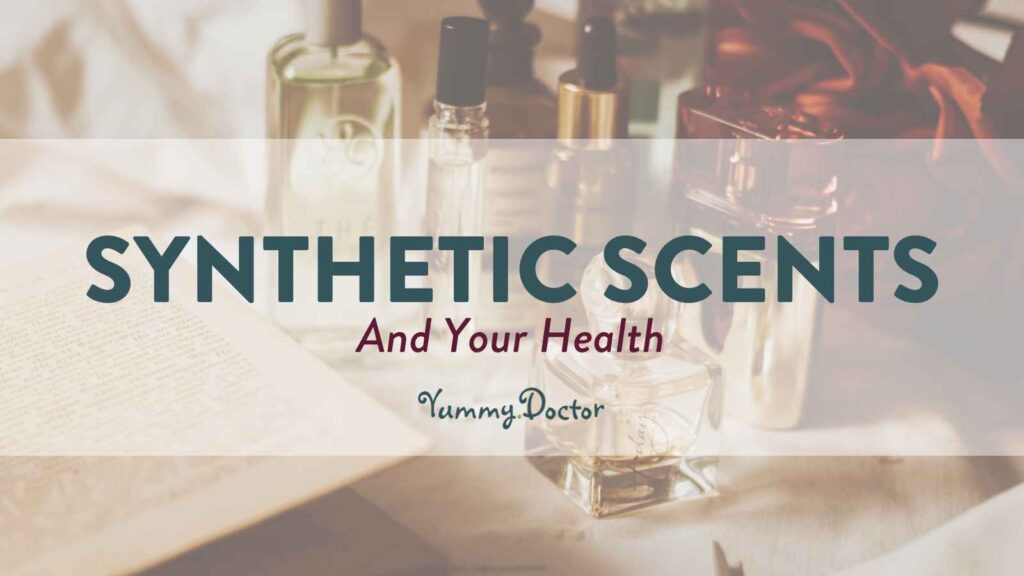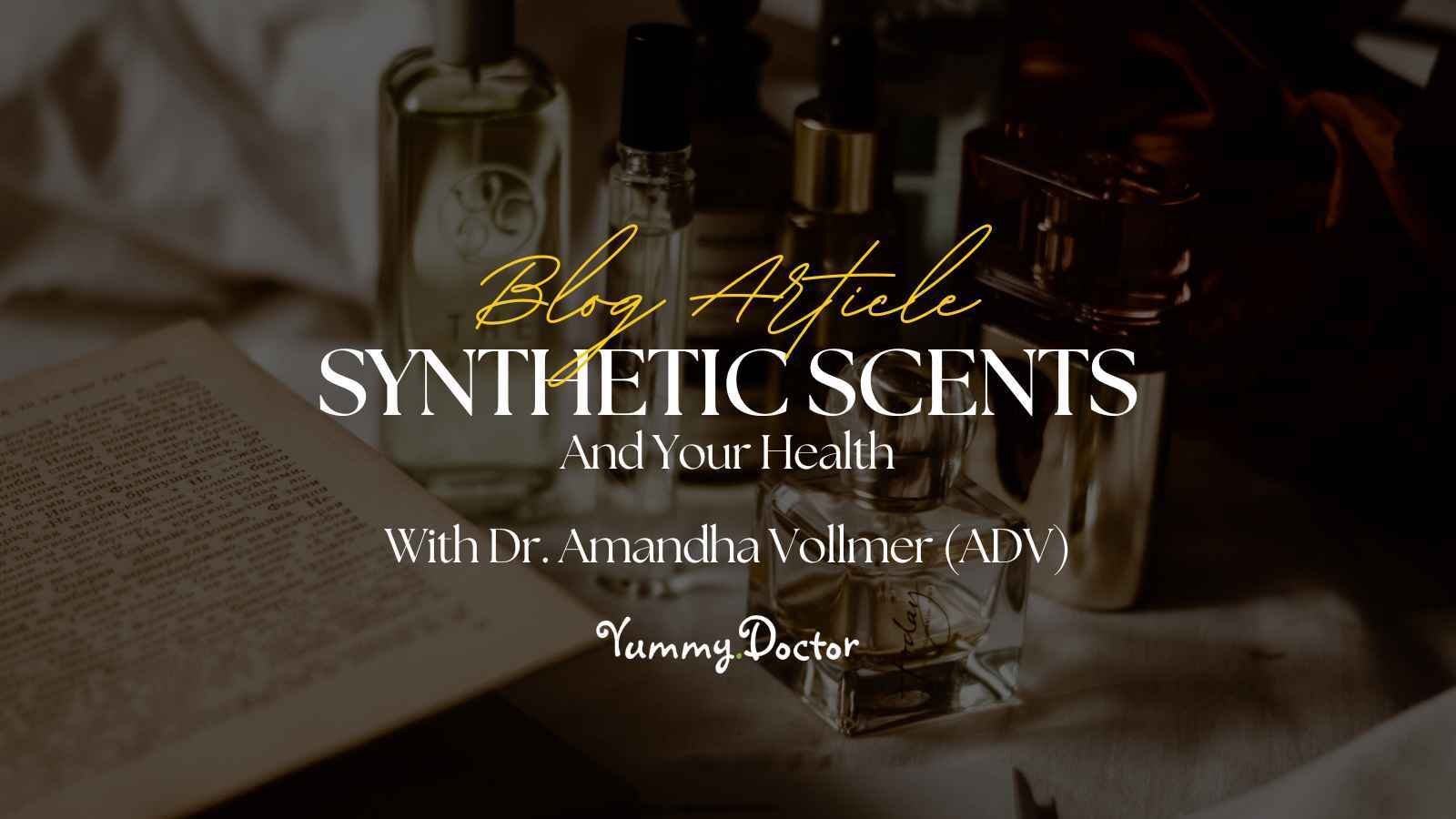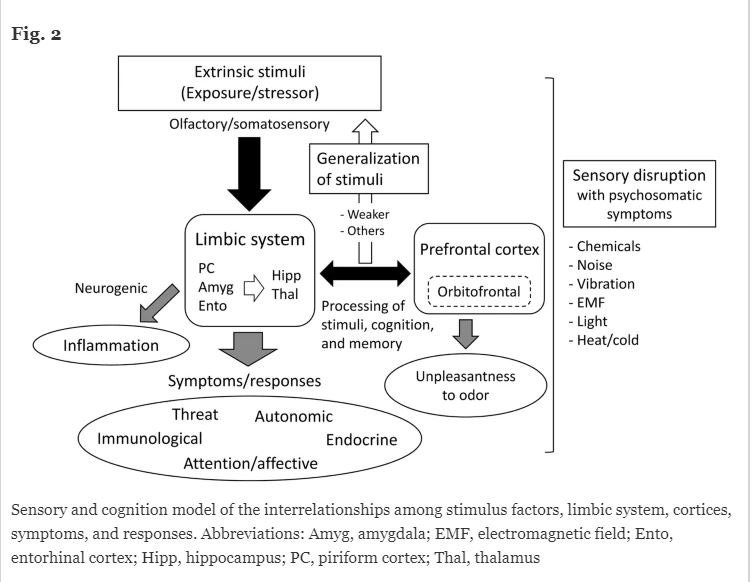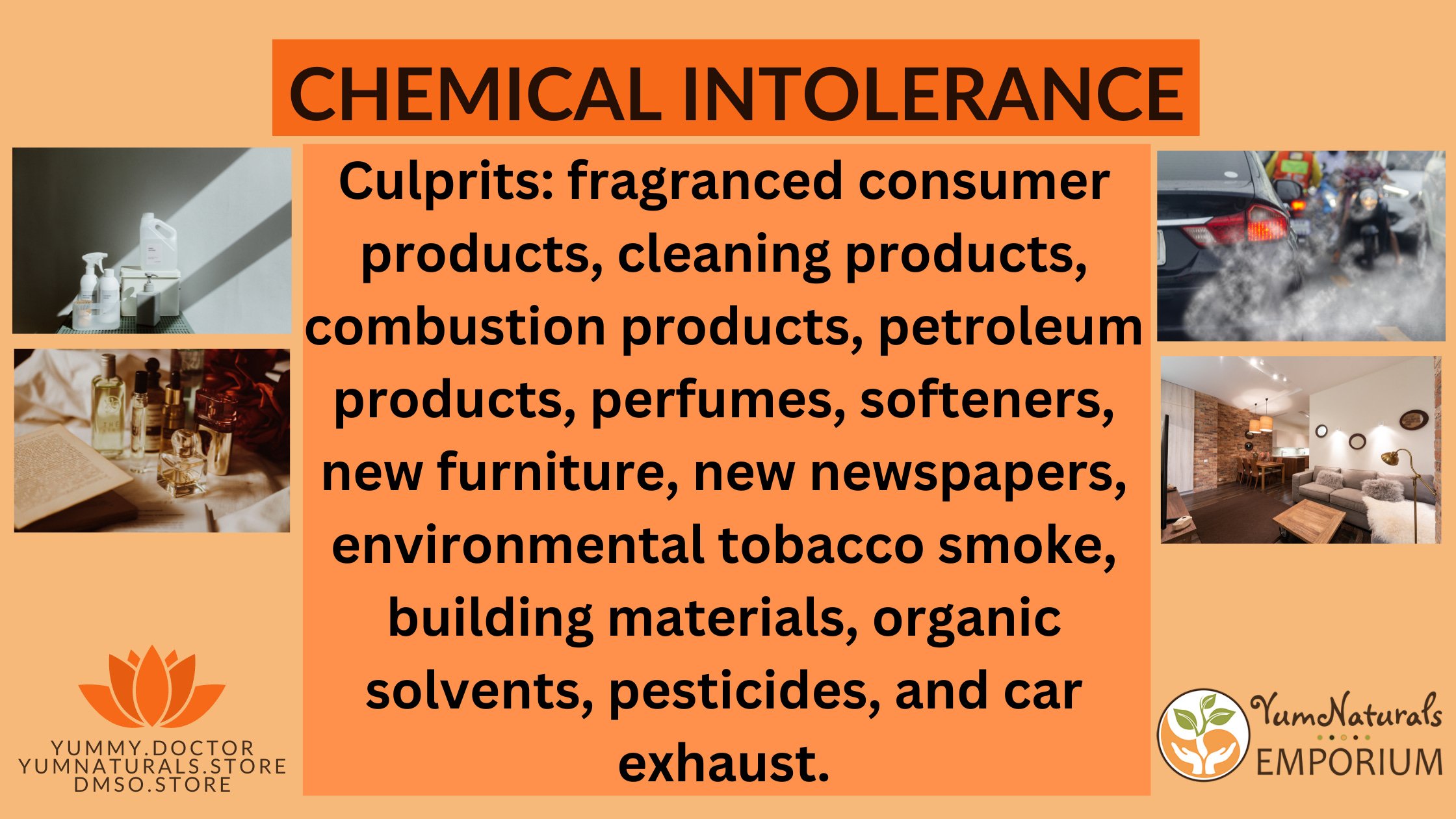Synthetic Scents and Your Health


What Are Synthetic Fragrances?
Synthetic fragrances can have a negative impact on our health. The compounds used to create these fragrances are known or suspected endocrine disruptors, meaning they tinker with our hormonal health and can trigger disease states. These chemicals are found in a wide range of products, including cosmetics, lotions, shampoos, cleaning products, new furniture, and air fresheners. Studies have found that exposure (through skin absorption or inhalation) to synthetic fragrances can lead to various health issues such as headaches, asthma attacks, allergies, and skin irritation. In addition to this, some of these chemicals have been linked to an increased risk of cancer and other serious diseases.
When I was pregnant and still living in Toronto, I would walk my dog around the block and by the time I was done, I felt ill from the stench of the toxic clothes dryer exhaust coming out of the homes. That was one of my many reasons I decided to leave the city for country life.
About 95 percent of chemicals used in synthetic fragrances are derived from petroleum (crude oil). They include benzene derivatives (carcinogenic), aldehydes, toluene, and many other known toxic chemicals linked to cancer, birth defects, central nervous system disorders, and allergic reactions. (1)
Synthetic fragrances, also known as “fragrance”, are created in laboratories by combining a variety of chemicals to produce a desired scent. These chemicals can be derived from natural sources or synthesized in the laboratory. The most common synthetic fragrances used in cosmetics and personal care products include musks, citral, coumarin, and linalool.
Multiple Chemical Sensitivity and Chemical Intolerance
Multiple Chemical Sensitivity (MCS) is a complex syndrome that manifests as a result of exposure to a low level of various common contaminants.
“At the beginning of the ’50, the allergist Theron G. Randolph5 was the first to note that some patients became sick after exposures to a wide range of substances, either job-related, either, broadly speaking, environmental, in concentrations below those considered toxic for most individuals. Dr. Randolph and his colleagues speculated the possibility of allergic reactions and maladjustment to explain the symptoms that are attributed to MCS. It is considered that chronic exposure to subtoxic doses, as well as any acute exposures, can, in some people with, perhaps, a particular metabolic and genetic predisposition, lead to a gradual process of substance sensitization.” Source
Chemical Intolerance (CI) is a chronic condition characterized by recurring and severe symptoms triggered by exposure to low levels of odorous or pungent substances. It is specific to inhalation of scents and their affects on the brain and physiology, whereas MCS considers a broader exposure.
Studies on Chemical Intolerance have shown that people who suffer from it have significant differences in the way their brains process sensory information, especially after exposure to extrinsic stimuli in the limbic system. This is because of how the brain responds to certain chemicals and how it affects the limbic system, which processes emotions and memories.
The study found that people with chemical intolerance had a higher level of activity in the amygdala, an area of the brain responsible for emotions and fear response. This suggests that people with chemical intolerance may be more sensitive to environmental triggers and may experience greater emotional distress when exposed to certain chemicals. The study also found that these individuals had impaired neurological processing in other areas of the brain such as memory formation and executive functioning.
These findings suggest that chemical intolerance can affect both physical and psychological health.
In this study, they found that neurological processing of sensory information after exposure to extrinsic stimuli (toxic scents) in the limbic system and related cortices were altered in subjects with CI. Differences in brain imaging were also observed between initial exposure and after exposure to these substances.

The function of odour perception in our brain is to continually monitor the environment and categorize odours into one of two large categories: those to approach or those to avoid. I find this fascinating as a protective measure, since I would include pheromones into this discussion; the loss of taste and smell also being part of an avoidance scheme by the body to product it from chemical assault. Since I lost my taste and smell (with no other symptoms) after an embrace from a freshly vaccinated woman, I started to research pheromones and their responses. These chemicals have impact on the action of the system and if the body deems there to be a severe danger, it could shut off the system to protect itself from a cascade effect. As an aside, after a year of this condition, the only thing I have found that has healed me from this is the Prife iTeracare Terahertz Frequency Blower Wand (if interested please email us for more info – support@yumnaturals.net). There is still much research to be done regarding pheromonal triggers and our health.
Those who have epigenetic chemical damage leading to gene mutations (like MTHFR and Histamine Intolerance, COMT, and Pyrrole Disease) can have a harder time detoxing and need specific supplementation in order to get these detox cycles and methylation tagging systems working properly.
How to Avoid Synthetic Fragrances
Be a smart consumer and read labels. This is an easy way you can avoid synthetic fragrances. Choose brands that employ natural methods for creating scent in their products.
- Choose only “unscented” and “fragrance-free” products—but read labels carefully, as some products use other chemicals to mask scent to hide certain chemical scents.
- Avoid those products that list “fragrance” or “parfum” in the ingredient list
- Shop at natural foods stores and on the internet for brands that are more conscious about the fragrances they’re using—this is the best way to avoid synthetic fragrances in your personal care products
- Look for scents that are naturally derived or plant-based
When my daughter was born, I was searching for all natural products to use on her like sunscreen, bug spray, diaper cream, boo-boo cream, shampoo, soap, etc., and at the time I couldn’t find anything that wasn’t green washed or truly pure. So that’s when I decided to make my own. Then I began to produce them for other families and started my business, YumNaturals Emporium. I used natural, pure essential oils in my products which have various health benefits. The issue is that someone who is already far down the road of MCS or CI have cross reactions even with natural scents and can feel bothered by them as well, even though they are not the root cause of the issue.

Avoiding toxins in a world that keeps producing more and more damaging chemicals, as well as spraying them all over our world via the geoengineering programs is a constant concern. Healing this condition takes diligence and time but the focus needs to be on various avenues of chelation and detoxification. There is much information on my website about various detoxes practices for the liver and how to remove metals and xenoestrogens. Always remember DMSO (dimethyl sulfoxide) as a help in assisting the body to remove metals and other wastes more efficiently. Learn all about DMSO in my book Healing with DMSO, so you can use the substance properly and safely.
Join me with Beth Martens on her King Hero’s Journey Vlog on January 25, 2023 for a live presentation discussing this important topic.
The video will be archived at https://yummy.doctor
It is important to be aware of what is going into our bodies and the environment when we use these products so that we can make informed decisions about what we purchase. These are things we do have some control over, so empower yourself with knowledge, and take action!
Link to original substack article: https://amandhavollmer.substack.com/p/synthetic-scents-and-your-health
Join Amandha’s Private Community!
Participate in specific health related groups, engage with holistic healers, educate yourself with step-by-step online courses, join Amandha in weekly video chats, and reach the ultimate natural health lifestyle.
![]()
Amandha D Vollmer (ADV)
BSc, Herbalist, Reiki Master,
Holistic Health Practitioner,
Degree of Doctor of Naturopathic Medicine
Websites:
Bringing the Wisdom of Nature Education: https://yummy.doctor/
YumNaturals Emporium Store: https://yumnaturals.store/
DMSO Products: https://DMSO.store
Healing with DMSO Book: https://healingwithdmso.com/
Support my Work by Making a Donation:
YUM BTC (Bitcoin) – bc1qayv9rjzlpc8hlc0t5d80le8u0g72f5p75570hz
YUM ETH (Ethereum) – 0xD4AE2Ae316435e4e68DC0c5D2131c2252fD9B0c4
https://yumnaturals.store/product/general-fee-or-donation/
https://www.patreon.com/yumnaturals
Telegram Chats:
1. ADV’s Main Channel: https://t.me/amandhavollmer
2. ADV’s Legal/Lawful Templates Group: https://t.me/HDoT_Templates
3. ADV’s Local Ontario Group: https://t.me/ontarioawake
Advice Disclaimer:
The website content, including but not limited to blogs, newsletters and videos with Amandha Vollmer are intended for general information only, and are not intended to be a substitute for legal, medical or financial advice, and should not be construed as legal, medical or financial advice applicable to your particular situation. No attorney-client or confidential relationship is or will be formed by use of this website or the contents within.


